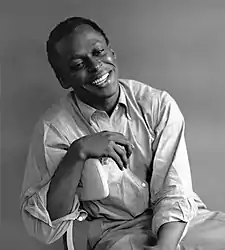_(14779686352).jpg.webp) A fictionalized Myles Standish is a character in Henry Wadsworth Longfellow's 1858 poem The Courtship of Miles Standish. | |
| Pronunciation | /ˈmaɪlz/ |
|---|---|
| Gender | Masculine |
| Language(s) | English via Norman French |
| Origin | |
| Meaning | Latin soldier; Persian brave, Slavic gracious |
| Other names | |
| Related names | Milo, Myles |


Miles or Myles /ˈmaɪlz/ is a Norman French masculine given name of uncertain meaning. It might have been a changed diminutive of the name Michael that was influenced by miles, the Latin word for a soldier, because of associations with Archangel Michael, the Roman Catholic patron saint of the military. Milo, the variant of the name used most often during the medieval era, might also have been influenced by the Slavic word element -mil, meaning gracious. Myles is a variant spelling in English.[1] In Ireland, the name was used as an English substitute for Irish language names such as Maolra,[2] or Maolmhuire, both meaning devoted to Mary, Maolmhorda, meaning servant of the great, and Maolruanaí, meaning servant of the champion. Development of the name might also have been influenced by the Persian name Mylas, meaning brave. The original name of Miles (bishop of Susa), an Orthodox Christian saint, was Mylas. The name has been in regular use in the Anglosphere since the 1500s. It was popularized in England by Myles Coverdale, who produced the first complete printed translation of the Bible into English in 1535. In the United States, the name became well-known due to Myles Standish, a soldier who arrived on Plymouth Rock on the Mayflower with the Pilgrims in 1620. American poet Henry Wadsworth Longfellow wrote a popular 1858 poem, The Courtship of Miles Standish, in which the fictionalized Standish is rejected by Priscilla Mullins, who chooses John Alden as her husband instead. Miles and Myles were both more commonly used in the United States than in the United Kingdom by the 1800s due to usage by Irish immigrants to the United States and the influence of Miles Standish. There was an increase in usage from the mid- to late 20th century associated with jazz instrumentalist Miles Davis and with the popularity of fictional characters such as Star Trek character Miles O'Brien, Myles Mitchell, a character on the 1990s American television series Moesha, Miles Edgeworth, a character from the Ace Attorney video game franchise, and fictional Marvel Comics superhero Miles Morales.[3]
People with the name
- Miles (bishop of Susa) (d. c. 340)
- Miles of Gloucester, 1st Earl of Hereford (d. 1143)
- Miles of Plancy (d. 1174), Crusader knight
- Miles de Cogan (fl. 1170s), Anglo-Norman knight
- Miles de Angulo (fl. 1250s), Anglo-Irish knight
- Miles of Marseilles (b. c. 1294), Jewish physician
- Miles de Noyers (d. 1350), French diplomat
- Miles Aiken, American basketball player
- Miles Austin, American football player
- Miles Berkeley, British botanist and clergyman
- Miles Boykin (born 1996), American football player
- Miles Brown (American football) (born 1997), American football player
- Miles Browning, United States Navy admiral
- Miles Dempsey, British Army general
- Miles Davis, American jazz trumpeter
- Miles Fleetwood, English politician
- Miles Franklin, Australian author
- Miles Heizer (born 1994), American actor
- Miles Holmwood, Canadian guitarist and record producer
- Miles James, United States soldier
- Miles Kane, English musician
- Miles Lord, American jurist
- Miles Malleson, English actor and screenwriter
- Miles Mander, English actor
- Miles Mikolas, American baseball player
- Miles E. Mills, American politician
- Miles Nazaire (born 1995), English television personality
- Miles Ocampo, Filipina actress
- Miles Nightingall, British army officer
- Miles Partridge, English courtier
- Miles Plumlee, American basketball player
- Miles Romans-Hopcraft, English musician under the name Wu-Lu
- Miles Routledge (born 1999), English author and war tourist
- Miles Sanders (born 1997), American football player
- Miles Sandys, English politician
- Miles Stapleton of Bedale, English knight
- Miles Teller, American actor
- Miles Thomas, British businessman
- Miles Walker, Manx politician
- Miles Warren, New Zealand architect
Fictional
- "Baby", protagonist in the film Baby Driver whose real name is Miles
- Miles, a mule character in the animated movie Barnyard
- Miles, a character in the animated series The Ridonculous Race
- Miles, a character in the animated series Rimba Racer
- Miles Archer, character in the novel The Maltese Falcon and its adaptations
- Miles Axlerod, character and main antagonist of Cars 2
- Miles Bailey, character in the British soap opera Doctors
- Miles Callisto, character in the animated television series Miles from Tomorrowland
- Miles Dyson, character in the film Terminator 2: Judgment Day
- Miles Edgeworth, character in the Ace Attorney series
- Miles Hendon, character in the novel The Prince and the Pauper and its adaptations
- Miles Hollingsworth, character in the television series Degrassi: The Next Generation
- M (James Bond), character in the James Bond novels whose real name is Sir Miles Messervy
- Miles Lennox, character in the television series Backstage
- Miles Morales / Spider-Man, character from Marvel Comics
- Miles Mayhem, antagonist of the animated television series M.A.S.K.
- Miles Matheson, protagonist of the television series Revolution
- Miles O'Brien (Star Trek), character in the Star Trek universe
- Miles Papazian, character in the television series 24
- Miles "Tails" Prower, fox character in the Sonic the Hedgehog series
- Miles Quaritch, the central antagonist of Avatar and its sequels
- Miles Silverberg, character in the television series Murphy Brown
- Miles Straume, character in the television series Lost
- Miles Teg, character in the Dune universe
- Miles Upshur, character in the video game Outlast
- Miles Vorkosigan, character in the Vorkosigan Saga novels and stories
- Miles Warren a.k.a. the Jackal, antagonist in Spider-Man comics
- Miles Webber, character in the television series The Golden Girls
- Major Miles, a character in the manga series Fullmetal Alchemist
- Miles, a character in Henry James' novella The Turn of the Screw
See also
References
- ↑ Hanks, Patrick; Hardcastle, Kate; Hodges, Flavia (2006). Oxford Dictionary of First Names. Oxford University Press. p. 195. ISBN 0-19-861060-2.
- ↑ Hanks, Patrick; Hardcastle, Kate; Hodges, Flavia (2006). Oxford Dictionary of First Names. Oxford University Press. p. 352. ISBN 0-19-861060-2.
- ↑ Evans, Cleveland Kent (9 November 2023). "Cleveland Evans: Spider, 'servant' or Standish, Miles' popularity defies time". omaha.com. Omaha World Herald. Retrieved 5 January 2024.